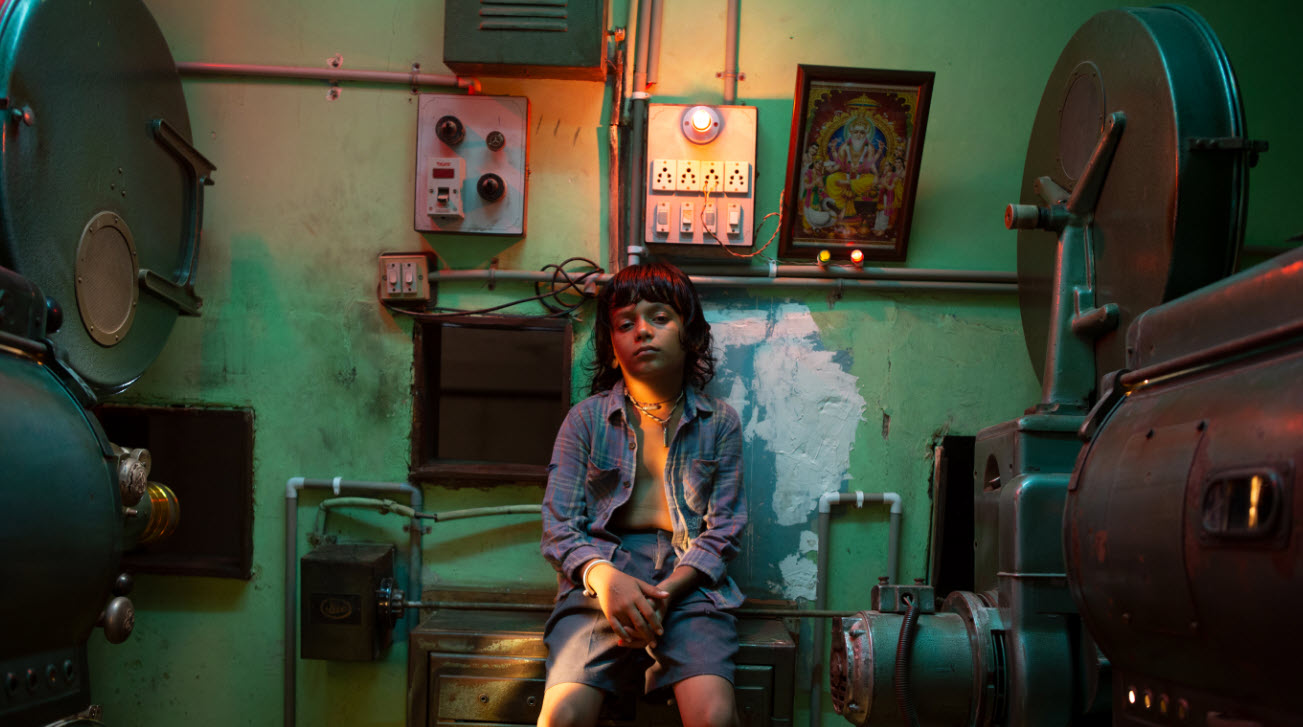Last updated on February 7, 2023
One day, Samay’s father announces that he is taking his family to the movies. Samay (Bhavin Rabari) is curious about this – his family has not been to see a movie since he was five years old. “Listen,” says his father, “once you’ve seen this one, you’ll never watch another again. I’ve told you many times, cinema is not appropriate for us.” But Samay’s father (Dipen Raval) is willing to make an exception for this film, Karishma Kali Kaa. The film stars Amrita Singh as Parvati, a devotee of Kali, so it’s deemed appropriate viewing for this Brahmin family.
Samay is more entranced by the light of the projector than he is by the film, but he’s also curious about how the light is transformed into the images he’s seeing on the screen. On the trip home, he tells his father about his friends who want to become a station master and an engineer – but then he also announces that he wants to make movies. His father advises him to keep quiet: “Have you ever heard of a Brahmin doing such a shameful job?” For the father, the film world is a place in sharp contrast with his own views and values. His sharp son notes that for all his father’s talk about honour, he’s still running a tea stall at a train station.
Samay sets off exploring the effect of light and how it is transformative, placing shards of coloured glass in a row on the train tracks. He’s a scavenger, collecting pieces of coloured glass and lamps through which to view the world. He gathers up matchboxes with pictures on them and later uses them to tell colourful stories to his friends. Samay is more curious about the world he views from the window of a train through a green glass bottle than the world he’s being taught about at school.
One day, he snatches a note out of his father’s moneybox, plays hooky from school, and heads to the movie theatre to watch an Akshay Kumar movie, where he is utterly transfixed. He’s late getting home after missing the train, and his frantic parents go to the police, who find him sleeping on a train bench. When he arrives home, his father chases and beats him, followed by his group of friends. At home, his father puts up a poster of “Traits of an Ideal Boy”, which Samay promptly crumples and throws out. For Samay will not be deterred. He next sneaks into the theatre to see Jodhaa Akbar. The light coming from the projection booth is just too much of a temptation for this boy, who is curious how light transforms into moving images.
This time, however, Samay is tossed out of the theatre for not paying for his ticket. He meets the projectionist, Fazal (Bhavesh Shrimali), while he’s eating lunch. Samay tells the projectionist his mother (Richa Meena) is the best cook in the world, but he’s lost his appetite after being thrown out of the movie theatre, so he gives the man his lunch. In this way, a deal is struck: Samay will trade his lunches for access to the projection booth to watch movies. In the projection booth, Samay not only watches films, but he also trades dialogues with the projectionist, he dances to the songs, and he learns how to splice film together and change reels, all the while still entranced by the whirring projector. Eventually, he asks Fazal how films are made. According to Fazal, films are all about stories. “Stories and movies have an old relationship.” Fazal notes that politicians and shopkeepers both tell stories, the former to win votes, the latter to sell goods. For Fazal, the future belongs to storytellers because they’re good at the lies needed to get ahead. This is good news for Samay, who considers himself an excellent liar.
Fazal is wrong in one respect, though – the future belongs to those who know English, as Samay’s teacher also reminds him. The last film show for Samay is not, as we discover, the one film his father feels is appropriate for his family’s viewing. That was merely the start of Samay’s journey into film and filmmaking. But the world is changing. One movie gives way to another, and eventually, the film projector and reels are abandoned for a computer and CDs, which Fazal cannot operate because, as he notes, he’s not a man for words or numbers. Samay and his friends trace the final journey of the projector and its film reels as they are transformed into spoons and bracelets.
I reviewed Palin’s film Faith Connections when it screened at the 2013 Toronto International film festival, and I noted that one of its striking features was the place of children at the Kumbh Mela – children who are lost, abandoned, rescued, or runaways. Children are central to Palin’s latest film, too – Samay, of course, but also his group of companions who are entranced by the magic of light and story just as much as he is. With them, he eventually builds a make-shift projector and steals film reels so they can try to create their own movie magic. Chhello Show is a lovely look at a childhood informed by adventures and storytelling and is a charming tribute to not only childhood and movies but also to a mother’s love bundled into every lunch tiffin she packs for her son, and to a father who finally realizes that the ideal Indian boy might just be his own son, Samay, with his dreams and desires so very different from his own.
This review first appeared on Bollyspice as part of the coverage of the Austin Indie Meme Festival 2022.

